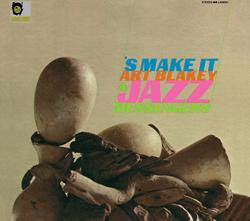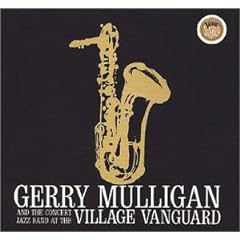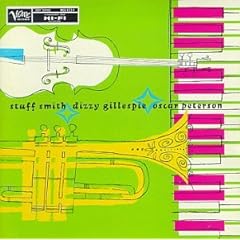Oscar Peterson made a great album with Dizzy Gillespie and Stuff Smith, the violinist.
I never heard of Stuff Smith. I'll have to look him up. I love violin. Diz is someone with a big rep whose work I haven't heard that much of, but this is explained by my not being a big Bop appreciator, if I'm understanding the meaning of the term in all of its nuances. ( There is also what is known as "hard Bop". )
Beat - I, too, enjoy Pete Fountain. I've listened to some of his other albums, but haven't heard the one you referenced. Is it really that different from his other albums ? Pete plays Jazz that is ....more accessible....That's one way of putting it, anyway.
( The earliest forms of actual "Jazz" are now known as "Ragtime" and "Swing", and they were also once known as "Pop" music, believe it or not, you youngsters. )
BTW - Dexter Gordon played "Prez" in the movie about his life that featured a lot of performances.
I noticed the person who mentioned something to the effect of Jazz being the choice of starving musicians, or words to that effect. OT -
A Zappa quote, wasn't it ? ( Zappa was lucky ( right time, right place ) to break into "niche mainstream" with his unusual take on rock, and so his comment is redolent of his usual irony and conundrum; said irony not being entirely 100 percent intentional, either IMO. He saw some things as being "highbrow", and some highbrow as being "gimmicky", without always acknowledging that his own work could be seen as such also, despite ribald ( ribald = "earthy" ? ) lyrics etc. As I was saying, there was a time when Jazz and Pop music were the same thing. If the Jazz "community" had not migrated so enthusiastically to Bop then maybe we would still have more offerings along these lines, versus some of the "songs" popular today that are really more about attitude than music.
The last paragraph is just my off the cuff remarks on the subject of accessibility etc. as there is a lot of music I have yet to hear, and I do like some that is called "Bop". My admittedly outsider understanding of this phenomenon breaks it down thusly:
( 1. ) There have always been artists who seem to cater more to other artists than to the average public, and so perhaps what I am referring to simply references the sonic equivalent of that.
I'm not advocating going for some kind of "lowest common denominator" approach, but the opposite extreme is unappealing to me as well, and sometimes has an "emperor's new clothes" aspect to it. It's amusing to note also that ghetto slang and "underworld" terms ( the two mingling somewhat ) are evolving in similar patterns, with new phrases coming along as soon as the "old" ones are generally known/accepted. This way there is always a group that is "in the know" and more "hip"* than those not in on such secrets.
( 2. ) I read somewhere that some of Ornette Coleman's work and initial inspiration could be considered to be a pastiche ( or perhaps parody ) of the later more "out there" work of John Coltrane. Coleman's work is where some choose to draw the line. Other people consider Ornette more "down to earth" because his "no rules" approach allows for more "freedom" and is not built around a dance with constraints the way most Jazz is. I haven't heard a great deal of the work of either man, and so I haven't formed a firm opinion on whether it strikes me as mostly "noise". ( So far I prefer Coltrane's offerings of standards, in company with other artists, to his solo experimental work. There is an album wherein he plays with McCoy Tyner and Johnny Hartman that I like. )
( 3. ) One major part of the brain that looks for pattern re: input is the auditory cortex. One might call this the "new noise" department. It attempts to try and dissect it and understand it. This corticofugal network is always fine tuning what we hear and how to interpret things. If there is a minimal failure of this attempt we get a small dose of Dopamine, which gives us good feelings associated with such a precursor novelty. If we get a large amount of this, and thus a correspondingly large amount of Dopamine, we experience this as a temporary craziness, which is typically of the undesirable sort.
When Stravinsky premiered his "Rite of Spring" in May of 1913, the audience was completely unprepared for the dissonance in the work. ( It would not be a big deal for most of us today, because this approach to music is not so new anymore. ) The audience literally rioted. There were people striking one another with canes ( drawing blood ) and other shenanigans amongst a normally genteel crowd. Nijinsky was screaming at his dancers throughout it all to stay on the beat.

Stravinsky hadn't expected to be seen as such a villain and IIRC he had to exit the theater by an obscure back way.
The word got out, naturally, and thus people had more "warning" and thus more accurate expectations the next time the work was performed. This was in March of 1914. On this occasion, people were actively looking for the "hidden order" ( pattern ) and many of them were finding it. Those who didn't find much of it were still not so surprised as the first time. Stravinsky emerged from this concert as a hero, literally carried on the shoulders of the surging crowd of new fans, in fact.
The music eventually became acceptable enough that it was used in a Walt Disney movie circa 1940.
Relevance of this Stravinsky anecdote to the thread on Jazz, and these comments of mine about accessibility of Jazz ? Bop was probably an experiment in musicians appreciating a "hidden order", and from there developing further, as each musician attempted to widen the boundaries - with a new break in the tacit ( or heretofore acceptable ) forms. However, I think that the race between such musicians moved so fast that the average American has still not caught up with it, even though it is not always about dissonance, in the case of Jazz.
( 4. ) Since true randomness is supposed to be actually a rare thing, calling some sounds we hear "noise" may not strictly be accurate, but, for most of us, we appreciate slipping into the ( shallower ? ) cool waters gradually versus being thrown forcibly into a deep frigid depth ( "Which way is UP ? " ) from the get-go.
OT -
A tangent thread could probably be constructed about whether "N's" see hidden order sooner and more effectively, and so therefore are the vanguard of these boundary expansions. Separating these people from those who are "merely pretending to enjoy bitter wine so as to appear elite" ( analogy ) can be hard to do sometimes, and it can even be sincerely unclear to some of those actually participating whether they have their feet in both camps, or one or the other.
* The word "hip" has changed its meaning over time, I have been told by a young person. He referred to Paris Hilton as being "hip" and I remarked that, on the surface, she seems to be one of the most UN-hip public figures that i can think of. He showed a smiley emoticon at that and said that the definition of hip these days had more to do with whether someone or something was popular.





